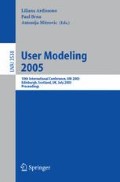Abstract
In this paper we introduce an effective mechanism for obtaining computer games of high interest (i.e. satisfaction for the player). The proposed approach is based on the interaction of a player modeling tool and a successful on-line learning mechanism from the authors’ previous work on prey/predator computer games. The methodology demonstrates high adaptability into dynamical playing strategies as well as reliability and justifiability to the game user.
Access this chapter
Tax calculation will be finalised at checkout
Purchases are for personal use only
Preview
Unable to display preview. Download preview PDF.
References
Charles, D., Black, M.: Dynamic player modelling: A framework for player-centric digital games. In: Proceedings of the International Conference on Computer Games: Artificial Intelligence, Design and Education, pp. 29–35 (2004)
Cheng, J., Greiner, R., Kelly, J., Bell, D.A., Liu, W.: Learning Bayesian Networks from Data: an Information-Theory Based Approach. The Artificial Intelligence Journal 137, 43–90 (2002)
Heckerman, D., Geiger, D., Chickering, D.M.: Learning Bayesian networks: the combination of knowledge and statistical data. Machine Learning 20, 197–243 (1995)
Houlette, R.: Player Modeling for Adaptive Games. AI Game Programming Wisdom II, pp. 557–566. Charles River Media, Inc. (2004)
Pearl, J.: Probabilistic Reasoning in Intelligent Systems, Networks of Plausible Inference. Morgan Kaufmann Publishers, Inc., San Francisco (1988)
Yannakakis, G.N., Hallam, J.: Evolving Opponents for Interesting Interactive Computer Games. In: Proceedings of the 8th International Conference on Simulation of Adaptive Behavior, pp. 499–508. The MIT Press, Cambridge (2004)
Yannakakis, G.N., Hallam, J.: Interactive Opponents Generate Interesting Games. In: Proceedings of the International Conference on Computer Games: Artificial Intelligence, Design and Education, pp. 240–247 (2004)
Author information
Authors and Affiliations
Editor information
Editors and Affiliations
Rights and permissions
Copyright information
© 2005 Springer-Verlag Berlin Heidelberg
About this paper
Cite this paper
Yannakakis, G.N., Maragoudakis, M. (2005). Player Modeling Impact on Player’s Entertainment in Computer Games. In: Ardissono, L., Brna, P., Mitrovic, A. (eds) User Modeling 2005. UM 2005. Lecture Notes in Computer Science(), vol 3538. Springer, Berlin, Heidelberg. https://doi.org/10.1007/11527886_11
Download citation
DOI: https://doi.org/10.1007/11527886_11
Publisher Name: Springer, Berlin, Heidelberg
Print ISBN: 978-3-540-27885-6
Online ISBN: 978-3-540-31878-1
eBook Packages: Computer ScienceComputer Science (R0)

